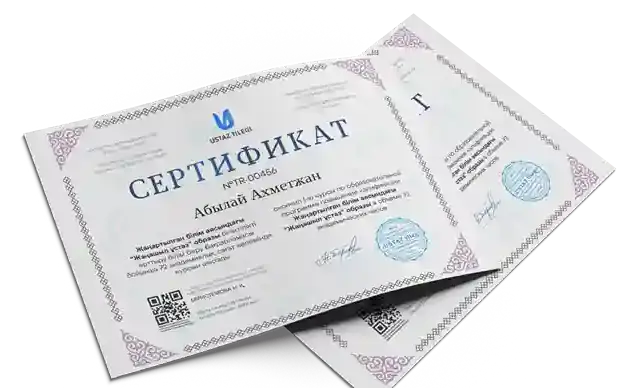Article
Distance learning in Kazakhstan
ARU
named after K.Zhubanov
Foreign
language:two foreign languages
Meirimkhanova Ayazhan
Distance learning plays an
increasingly important role in the educational process. Modern
education is impossible without the Internet, which is firmly
embedded in our lives. Specialists of all professions need to
constantly improve their knowledge, skills and abilities in order
to meet the high professional level dictated by the needs of our
modern society. In the context of the pandemic and the strict
quarantine, vital issues related to training and education in
general have arisen. And this need has led to the search for new
methods of knowledge transfer and learning technologies. To
organize the educational process, all teachers and students are
provided with access to electronic platforms. Video tutorials,
independent online work, and online courses are used as a tool. A
lot of work is being done to download educational and
methodological complexes, tests, and digital educational
resources.
Teachers at colleges and
universities still have to perform their duties remotely. For
Kazakhstan, the introduction of high-quality distance education
technologies and open education is also a solution to an important
social problem. Our republic has a large territory, which, with a
relatively small population, causes its low density in the country.
A significant part of the population lives in villages and
localities that are remote from cities, regional and district
centers. There are settlements in which small schools operate.
There are also those where there are only primary schools. With the
emergence of small farms and livestock farms in remote pastures,
family groups are formed in which children do not have the
opportunity to attend school. In such cases, providing the
population with even compulsory general secondary education becomes
a difficult problem. To this must be added the disabled and people
with disabilities, also experiencing difficulties in obtaining
education. This is a completely new format. The TV channels
"Balapan " and" El Arna " provided the Ministry with their airtime.
Filming began during the school spring break. In total, more than
2000 video tutorials on the main subjects were
filmed.
Classes are held through
specialized Internet platforms. Previously, access to the
educational content of these companies was paid, but the Ministry
of Education agreed that children would receive all the information
and use these systems for free. These digital systems allow
students to view the previous lesson or the topic they discussed
earlier, conduct online lessons, webinars, conferences, receive
feedback, and create an opportunity for individualization and
gamification of learning. This format will also allow testing and
evaluating the knowledge gained.
Distance learning is a
really serious challenge for our education system. At first, there
was a lot of criticism, both from the parents of students,
students, and from teachers.
On the part of the
Ministry of Education, various questionnaires and surveys were
organized, and as a result, the necessary measures were taken to
increase the availability of distance learning. In the modern
world, an increasing number of people prefer distance
learning.
The state of emergency in
connection with the COVID-19 outbreak was introduced in Kazakhstan
for the period from March 15 to April 15. For schoolchildren, an
early school holidays were announced from March 16 to April 5. In
order to ensure the continuity of the educational process,
schoolchildren and students were transferred to the distance
learning format, in accordance with the approved academic load,
plan, program and schedule. At the same time, the dates of the
Republican Olympiad of schoolchildren in general education
subjects, the National Intellectual Olympiad for rural schools and
other competitions have been postponed. Until April 5, the Ministry
of education and science of the Republic of Kazakhstan (hereinafter
– the Ministry) has conducted organizational work and preparation
for the transition to distance learning, including content
provision of information systems, teacher training, testing
services, etc. The experience of other countries that have
transferred students to distance learning was studied. During this
period, school teachers have already started to work remotely,
performing methodological and preparatory work while at home.
Teachers were transferred to the remote format of work with the
preservation of salaries on the same terms and in the same amounts
as in the usual time. Teachers have prepared for 1.5 months, took
online courses, and have been learning to use digital technologies.
On April 1, teachers have conducted trial distance lessons, on
April 2, parents' meetings have been held online, and on April 3,
class hours were held throughout the country. To prepare for the
transition to distance learning the Ministry has created a working
group to conduct preparatory work in several areas: A) Information
systems that provide sending the task, task completion
verification, evaluation, and feedback. B) Systems that provide
access to video lessons, tasks, assessments, tests, discussion and
problem solving; if necessary, teachers can use video streaming
services with their classes. C) Classes via dedicated TV channels,
where video lessons will be broadcasted according to the schedule.
This is especially important for rural schools that have
insufficient Internet capacity and lack of equipment. TV channels
for this purpose have already been allocated to the Ministry. At
the same time, the Ministry sought to create an effective format
for distance learning, which should not be identified with online
learning. According to the Minister of education and science of
Kazakhstan Askhat Aimagambetov, "the distance learning is much
broader and involves the use of several methods and tools at once.
It provides a large field for gamification, opportunities for
self-organization, and, most importantly, personalization of
learning." So, for example, more than 400 video lessons were
prepared for airing on television, as well as on the YouTube
platform.
References:
1.Aguiar A, Chepeliev M,
Corong E, McDougall R, and van der Mensbrugghe D (2019). The GTAP
Data Base: Version 10. Journal of Global Economic Analysis, 4(1),
1-27. Retrieved from
https://www.jgea.org/resources/jgea/ojs/index.php/jgea/
article/view/77.
2.Arndt, C. and J. D.
Lewis (2001). The HIV/AIDS Pandemic in South Africa: Sectoral
Impacts and Unemployment. Journal of International Development
13(4): 427-49. Barker, W. H. and J.
P.











